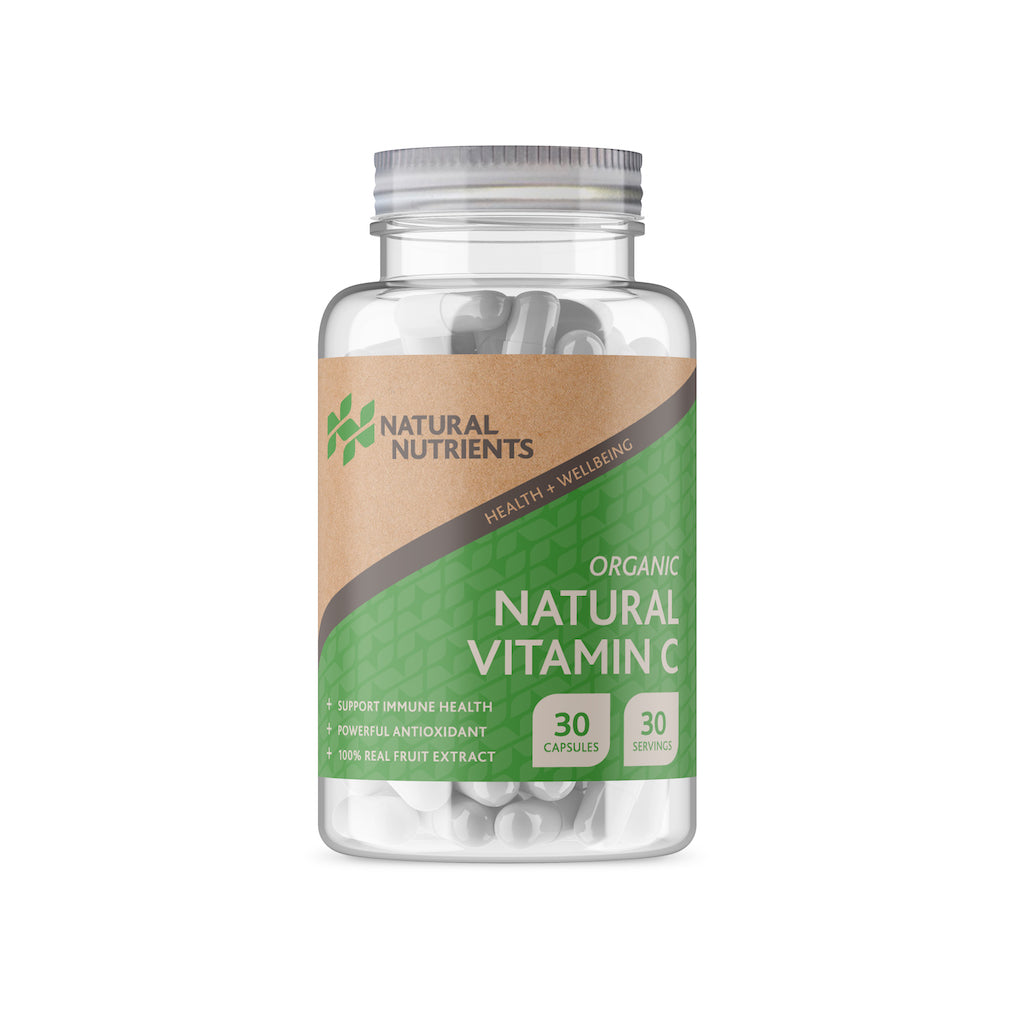The Many Benefits of Vitamin C


Vitamin C is arguably the most researched nutrient of all time. It’s discovery in the 1930s put an end to scurvy and opened a world of understanding into how food directly effects health. The more we learn about this nutrient – the more we love it! Read on to discover the many functions and benefits of this essential nutrient – and how you could benefit from taking a Vitamin C supplement.
What is Vitamin C and why do I need it?
Ascorbic acid, more commonly known as Vitamin C, is a water-soluble vitamin which cannot be stored in the human body. This means regular intakes of the nutrient are essential to prevent deficiency. Signs of Vitamin C deficiency include brittle nails and hair, dry scalp and lips, bruising easily, weakness and poor wound healing. Deficiency is fairly uncommon in the modern world thanks to our varied diets and accessibility to fresh fruit and veg. However, it is thought that many of us do not have optimal levels of Vitamin C – that is the amount which is needed to reap its many benefits.
Vitamin C: A Cure for the Common Cold?

When asked about Vitamin C two things spring to most people’s minds: oranges and colds! That’s right, it is commonly believed that colds can be cured by oranges and other citrus fruits because of their high Vitamin C content. Interestingly, perhaps one of the most well-known nutritional-health interactions is not all its cracked up to be – and this has been a subject of controversy for over half a century. More recent research has shown that whilst taking Vitamin C at the onset of a cold may lessen its severity, routinely taking Vitamin C each day will likely have no effect whatsoever on whether or not you get a cold in the first place! So if Vitamin C won’t ward off colds, what can it help you with? The answer is…a hell of a lot more than the common cold!
The Health Benefits of Vitamin C
- Vitamin C is a powerful Antioxidant – Antioxidants work to neutralise oxidative reactions in the body which can be harmful. These reactions produce free radicals which attack and damage DNA and cell membranes, resulting in mutated cells. These cells are thought to be the trigger for all cancers. Free radical damage has also been linked to Parkinson’s Disease, Heart Disease, Alzheimer’s and Stroke. Given this, perhaps the most powerful role of Vitamin C is that of an antioxidant. What’s more, it is also vital for regenerating Vitamin E, also an antioxidant.
- Healthy skin, teeth, hair and bones – Vitamins C is required for over 300 metabolic processes in the human body, one of those being the production of collagen. Collagen is a structural protein needed for the growth of hair, skin, teeth and bones. Over 30% of our bone mass is made up of collagen. Studies have shown that those with diets rich in Vitamin C are less likely to develop osteoporosis – a degenerative disease of the bones. This can be explained by the Vitamin’s role in stimulating calcium absorption and Vitamin D activity.
- Lowering Cholesterol – Diets high in fat cause the liver to produce harmful levels of cholesterol. Mostly found in meat, eggs and prawns, some cholesterol is beneficial. However, a diet high in these foods can lead to a build-up of the substance in the blood stream. Over time, this puts us at risk of hardening of the arteries, atherosclerosis – which in turn can result in high blood pressure, blood clots and heart disease. In the role of an antioxidant, Vitamin C prevents cholesterol in the bloodstream from oxidation. Research has shown that only oxidised cholesterol causes atherosclerosis, and so Vitamin C plays a vital role in reducing the risk of heart attack and stroke.
- Type 2 Diabetes Complications – When blood sugar levels are high, as with Type 2 Diabetes, glucose is converted into something called sorbitol – a sugar alcohol which is more slowly metabolised than glucose. High levels of this have been linked to diabetic complications such as numbness and nerve damage (neuropathy) and damaged eyes (retinopathy), which – left untreated – can cause vision loss. As Vitamin C inhibits (stops) the enzyme which converts glucose to sorbitol, those with high intakes reduce the likelihood of developing these diabetic complications.
Getting Enough Vitamin C
We hope we have explained the importance of Vitamin C – and it’s astounding potential to improve health above and beyond the common cold! There’s no question about it, regular intake of this nutrient is absolutely essential.
Food Sources – Vitamin C is found abundantly in fruit and veg – namely citrus fruits, berries, broccoli, peppers and peas. Paprika is also a great source of Vitamin C, as it is derived from sweet peppers.
Vitamin C Supplements – The Department of Health advises that a healthy, balanced diet should allow us to meet our daily requirements of Vitamin C and so prevent deficiency. However, as discussed, many studies show that much of the health benefits of Vitamin C are achieved at high doses. So those with a less varied diet, or a diet low in fruit and/or veg are unlikely to achieve these levels. What’s more, because we do not synthesise or store the nutrient in our bodies, regular daily intake is essential. Taking a daily supplement is a convenient and reliable way to optimise your levels of Vitamin C
Natural Nutrients Organic Natural Vitamin C
We hope you’ve had a chance to take a look at our Organic Natural Vitamin C supplement, but if not here's a little bit more information.
· 100% Natural
Most Vitamin C supplements are made up of a synthetic form of ascorbic acid, which is made in the lab. Our new Vitamin C capsules contain natural ascorbic acid, extracted directly from the Amla fruit, or ‘Indian Gooseberry’ – a fruit celebrated for its antioxidant properties and numerous health benefits. What’s more, this natural source has a higher bioavailabilty of ascorbic acid – meaning it is more readily absorbed by the body.
· 100% Organic
The Amla fruit we extract our Vitamin C from are produced by methods which comply with organic farming standards. This means that they are free from pesticides, genetically modified organisms (GMOs) and fertilisers which are harmful to human health. We strive to ensure all of our products are as pure and clean as possible, choosing organic ingredients is one way we can meet this aim.
· 250% of your Recommended Intake per Capsule
The British Nutrition Foundation and Department of Health recommend daily intakes of 40mg Vitamin C per day to prevent deficiency. Our research has shown that a high dose of Vitamin C is optimal to facilitate health benefits, and this is supported by many studies. Each of our capsules contain 200mg ascorbic acid, which is 250% of your nutrient reference value (NRV). As doses of up to 1000mg Vitamin C are safe, our capsules offer a potent, reliable dose well within the safe range.
· Vegetarian and Vegan Certified
Our slow-release veggie caps are vegan-friendly and designed to offer protection from stomach acid, ensuring bioavailability of the vitamin as it is absorbed. We don’t add any bulking agents or fillers to our products. We use natural rice bran and rice concentrate to stabilise the ingredients, and nothing else but real alma fruit.
Vitamin C is an essential nutrient necessary for maintaining healthy skin, teeth and nails and for protecting against damage from free radicals which can cause cancer. Studies have shown that a daily high dose of Vitamin C is the most effective way to ensure the body is well equipped to carry out these functions. Supplementing your diet with our Organic Natural Vitamin C is a convenient, reliable and effective way to ensure your Vitamin C stores are optimal. We recommend taking one capsule per day with food for maximum effect. Visit our website to find out more about our Organic Natural Vitamin C and to explore the rest of the Natural Nutrients range!
Thanks for reading,
Stephanie Masterman
Natural Nutrients Nutritionist
References:
P. Scartezzini, F. Antognoni, M. A. Raggi, F. Poli, C. Sabbioni (2006) Journal of Ethnopharmacology. Volume 104, issues 1-2, 8 March 2006, Pages 113-118.
S. Milunalini, M. Krishnaveni (2010) Therapeutic potential of Phyllanthus Emblica (Amla): The Ayurvedic Wonder.
Anderson TW, Suranyi G, Beaton GH (1974) The effect on winter illness of large doses of vitamin C. Can Med Assoc J 111: 31–36.
Webb, A. and Villamor, E. (2008). Update: Effects of Antioxidant and Non-Antioxidant Vitamin Supplementation on Immune Function. Nutrition Reviews, 65(5), pp.181-217.
Vitamin C for preventing and treating the common cold.
Douglas RM, Hemilä H (2005) Vitamin C for Preventing and Treating the Common Cold. PLoS Med 2(6): e168. https://doi.org/10.1371/journal.pmed.0020168


Leave a comment